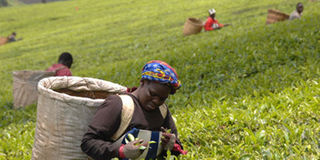Tea prices to remain low for 10 years: FAO

Farmers pick fresh tea leaves at a plantation.
What you need to know:
Tea prices are expected to be depressed, harming farmers.
According to the organisation’s 2015 report on global tea production, African tea growers will continue to suffer from lower prices of green tea in the world market for the next decade, unless measures are taken to diversify export market and increase demand at local and international levels.
Dar es Salaam. A glut of green tea in the global market will persist for the next decade unless actions are taken to raise the commodity demand, the UN Food and Agriculture Organisation (FAO) has warned.
Tea prices are expected to be depressed, harming farmers.
According to the organisation’s 2015 report on global tea production, African tea growers will continue to suffer from lower prices of green tea in the world market for the next decade, unless measures are taken to diversify export market and increase demand at local and international levels.
“In the medium term, the projections suggest that supply and demand of black tea will be in equilibrium in 2023 at a price of $2.81 per kg, if there is no supply over-reaction to the current firm prices,” reads part of the report titled ‘World tea production and trade, current and future development’.
There is normally the ILO group known as Intergovernmental Group which is responsible for carrying out negotiations on international tea trading.
“In determining the persistent problems of oversupply in the world tea market and the consequent downward pressure on world prices, the Group agreed that the response must involve an expansion in demand and a reduction in supply to achieve market balance. Given the already high consumption levels in traditional tea markets, demand for tea in producing countries should be looked at more closely,” the report reads.
Prof Damian Gabagambi of the Sokoine University of Agriculture’s Department of Agribusiness yesterday said since many new countries had started producing tea, competition had intensified. He suggested that innovation in tea production and processing should be undertaken to reduce costs to outperform rivals in the market.
“There is a challenge for entry of new tea producing countries even in the East African market. For example in the past Kenya and Tanzania were the major tea producers. But now there is an entry of Rwanda challenging the position of Tanzania,” said Prof Gabagambi.
Tea also has got too many substitutes. There is a great need for innovations to improve products to penetrate new markets, according to him.




